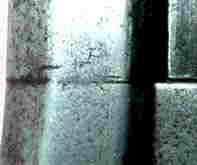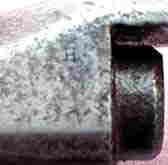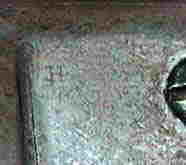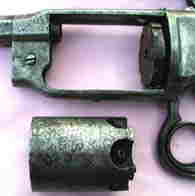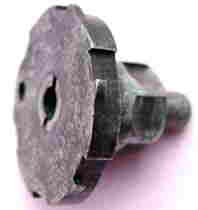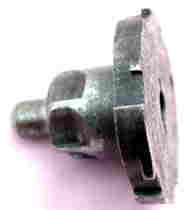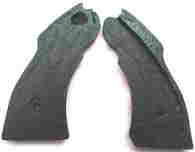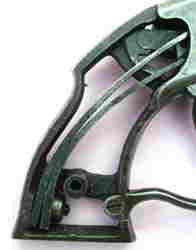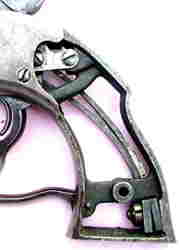|
|
|||||||
|
UGLY DUCKLING REVOLVER
|
|||||||
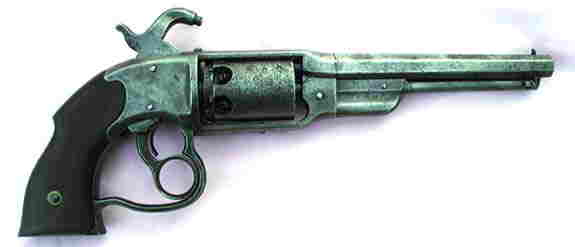
|
|||||||
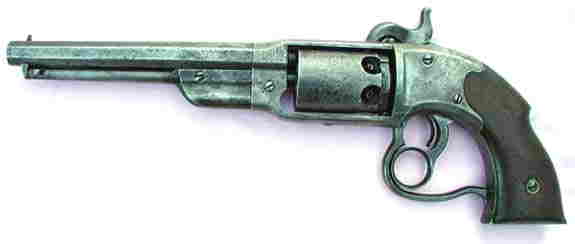
RIGHT
& LEFT VIEWS OF THE SAVAGE-NORTH .36 CALIBER REVOLVER
|
|||||||
|
The Savage-North revolver, a product of the Savage Revolving
Firearms Company, was patented by Henry S. North and Edward
Savage of Middletown, Connecticut. The Savage Revolving Firearms
Company, established in 1860, were successors to North &
Savage and E. Savage. Their original 1861 contract with the
government was for 5, 500 arms at a cost of $20.00 each. However,
in the first two years of the war, the government purchased
11,284 of these revolvers at an average cost of $19.00. Over
10,000 went to the Army with most being delivered by June of
1862. The Navy had one formal contract during the Civil War
calling for Savage to deliver 800 revolvers at $20.00 each.
These standard war time models were ordered on May 7, 1861.
300 were delivered in May, 200 in June, 100 in July and the
last 100 in September. These 800 were in addition to 300 delivered
to the Navy in 1860. Navy issues can be found with anchor stampings
and Naval inspector markings. The Savage-North revolver is a
direct descendant of the Savage & North Figure 8 Model Revolver
and the Alsop revolver sharing many similarities with both arms.
Alsop was also located in Middletown, CT. and three members
of the Alsop family served on the Savage Revolving Firearms
Company board of directors. Therefore, the relationship between
the two companies and the two weapons was more than coincidental.
|
|||||||
|
|
|||||||
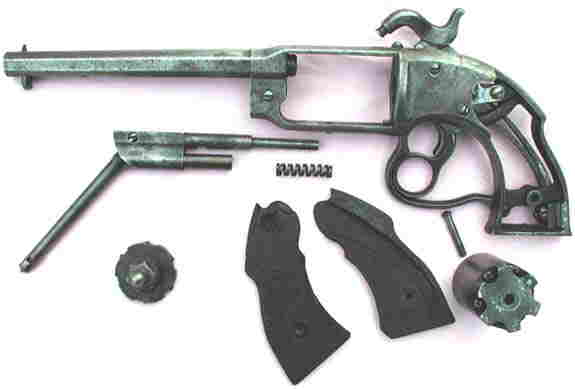
LEFT SIDE VIEW OF THE SAVAGE-NORTH NAVY REVOLVER WITH THE COMBINATION LOADING LEVER / CYLINDER ARBOR MECHANISM, CYLINDER ARBOR SPRING, CYLINDER, PRESSURE PLATE AND GRIPS REMOVED
|
|||||||
|
This single action, six-shot weapon is .36 caliber and weighs
3 pounds, 6 ounces. The 6-7/8" barrel is rifled with 5
grooves. Measured diagonally from the tip of the butt to the
muzzle face it is 14-1/2" overall. The barrel is unmarked except
for the government sub inspector's marking of "H" on the right
barrel flat just forward of the frame. The same "H" stamping
can be found on the top left of the frame in front of the cylinder;
on the top left of the frame just to the rear of the cylinder;
on the left of the ram rod assembly just forward of the frame
and on the cylinder between the nipple wells (one only). Other
inspector's stampings can be found on the back of the cylinder
("M") and on the left rear frame under the grip ("MM"). The
"M" & "MM" stampings are those of M. Moulton, Armory
Sub Inspector, 1861. The "H" stampings may be those of Benjamin
Hannis, Armory Sub Inspector, 1861. Stamped on the top frame
strap, over the cylinder, is "SAVAGE R.F.A. Co. MIDDLETOWN.CT
/ H.S.NORTH PATENTED JUNE 17 1856 / JANUARY 18 1859 MAY 15 1860"
in three lines. Other markings on this arm include the serial
numbers "666" or "999" stamped on the bottom flat of the barrel
at the rear under the ram rod assembly and on the right rear
frame under the grip. On the right forward frame under the grip
is another number; "153". Opposite the "M" mentioned above,
on the back of the of the cylinder, is the number "694". A illegible
cartouche of the inspector's initials is also stamped in the
left grip at the center bottom. One of the individuals who carried
this weapon has also scratched "T M" at the top of both grips.
|
|||||||
|
|||||||
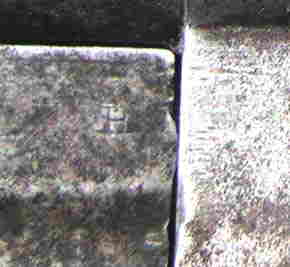
"H" STAMPING - RAM ROD ASSEMBLY LEFT REAR
|
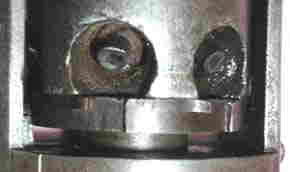
"H" STAMPING - BETWEEN NIPPLE WELLS ON CYLINDER
|
||||||
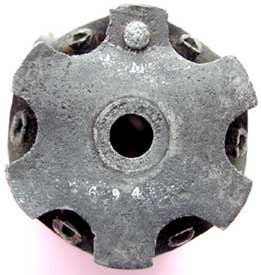
BACK OF CYLINDER - "M" & "694" STAMPINGS
|
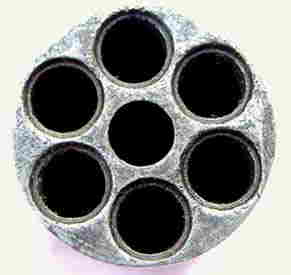
FRONT OF CYLINDER NOTE RECESSED CHAMBERS FOR GAS SEAL
|
||||||
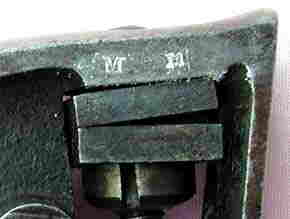
"M M" STAMPING - LEFT REAR FRAME UNDER GRIP
|
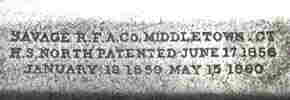
NAME STAMPING - TOP STRAP "SAVAGE R.F.A. Co. MIDDLETOWN.CT H.S.NORTH PATENTED JUNE 17 1856 JANUARY 18 1859 MAY 15 1860"
|
||||||
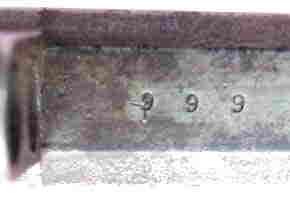
SERIAL NUMBER "999" OR "666"STAMPING BOTTOM BARREL FLAT |
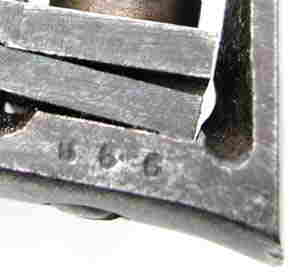
SERIAL NUMBER "999" OR "666"STAMPING RIGHT REAR FRAME UNDER GRIP
|
||||||
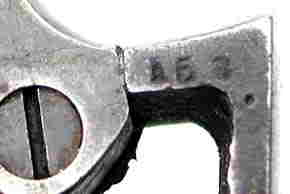
NUMBER "153"STAMPING RIGHT FRONT FRAME UNDER GRIP
|
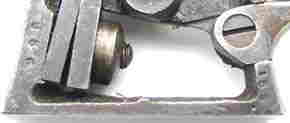
"999/666" & "153" STAMPINGS RIGHT FRAME UNDER GRIP
|
||||||
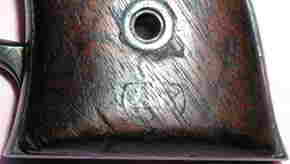
INSPECTOR'S CARTOUCHE - LEFT GRIP
|
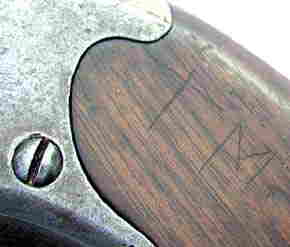
"T M" MARKS -LEFT GRIP
|
||||||
|
|
|||||||
|
There is a brass post front sight, set on center, 7/16" from
the muzzle face. The rear sight has a round base and is V-notched.
It is set just to the immediate rear of the hammer entry hole
in the top strap. The iron blued frame is flat sided with a
narrow slightly raised recoil shield behind the cylinder. Among
the distinctive features of this weapon is the "humped" back
strap, the large case-hardened off set hammer and the extreme
size of the off set case-hardened trigger guard containing a
ring cocking lever below a conventional trigger. Both
are cased-hardened. The heart shaped guard extends from
behind the cylinder to the lower part of the frame just above
the butt strap. The cocking lever or ring trigger when drawn
to the rear cocks the hammer, rotates the cylinder and draws
it backward away from the barrel. When the ring is released,
the cylinder moves forward locking the cylinder against the
beveled barrel breech to form a gas tight union. The arm is
then fired by pulling the upper trigger which releases the hammer
to fall on the percussion cap through the opening in the top
of the frame. The blued, six shot cylinder is 2" long with the
nipples recessed in three quarter circular wells. A separate
1/4" pressure plate on which the stop lugs are located is directly
behind the cylinder. The linked type case-hardened loading lever
is secured by a conventional "Navy" type latch. The linked cylinder
arbor is encircled by a substantial 1-1/4" long spring which
compresses against the pressure plate when the hammer is cocked
and is released after the hammer is cocked causing the cylinder
to move forward to it's gas tight position with the barrel.
The wide black walnut two piece grips are oil finished with
the inspector's cartouche, on military purchased arms, being
stamped into the left grip.
|
|||||||

RIGHT SIDE VIEW OF BARREL, FRONT SIGHT AND LINKED RAM ROD & CYLINDER ASSEMBLY
|
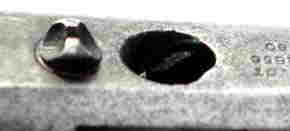
REAR SIGHT
|
||||||
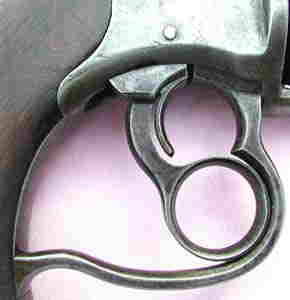 |
 |
||||||
| RIGHT
SIDE & BOTTOM VIEW OF TRIGGER GUARD, COCKING RING
AND TRIGGER
|
|||||||
|
|||||||
|
|||||||

|
|||||||

TOP AND BOTTOM VIEWS OF SAVAGE-NORTH REVOLVER
|
|||||||
|
|
|||||||
|
This posting was initiated through the comments of an English
visitor to this site who commented on the "beauty" of
the Savage-North Navy revolver. I unfortunately deleted his
email and his name thereby saving him the embarrassment of explaining
how in the world he could use that term in relation to this
arm. But as I said at the beginning "BEAUTY IS IN THE
EYE OF THE BEHOLDER". So be it.
|
|||||||
|
Reference material for this posting came from "U.S.
Military Small Arms 1816-1865" by Robert M. Reilly,
"Civil War Small Arms", an American Rifleman Reprint
- Articles "Civil War Revolvers Part 1 & 2 of 2"
by C. Meade Patterson & Cuddy De Marco, Jr.,
Norm Flayderman's "Flayderman's Guide To Antique
American Firearms... And Their Values", "Small Arms of the Sea
Services" by Colonel Robert H. Rankin, USMC (RET), "Civil
War Small Arms of the U.S. Navy and Marine Corps" by John
D. McAulay and finally, "Small Arms Makers" by
Colonel Robert E. Gardner.
|
|||||||
|
I should point out that without my library of books that I would
not be able to put these posting together with the detail as
given. Although the information in some of the books may
conflict, particularly as to stampings and markings and sometimes
measurements, I utilize what I see in front of me, the weapon
itself, so I can guarantee that information. However,
there may also be errors in the text that I use from these books,
so other than the hard evidence as pictured, I caution the viewer
from taking all statements as absolute fact as the writers of
these tomes are only human as am I.
|
|||||||
|
The photographs are all originals of mine as are any assumptions
or errors in this posting. My great webmaster is Reed
Radcliffe, my son, who puts this all together for your viewing.
What the next posting may be is anybody's guess at this point. However, there will be one, so come back in ten days or so and be surprised.
|
|||||||
| Dave
Radcliffe
|
|||||||
